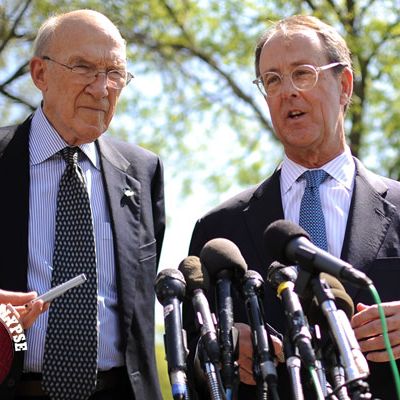
Fix the Debt is a uniquely fascinating beast in American politics. A group originally formed in the wake of the Bowles-Simpson commission and an outgrowth of legacy deficit-hawk groups like the Committee for a Responsible Federal Budget, Fix the Debt morphed last year into a massive, powerful fund-raising and lobbying group, with a “CEO council” that included corporate bigwigs like Jamie Dimon, Lloyd Blankfein, and Steve Ballmer.
The group’s original purpose was to lobby for a grand bargain to reduce the deficit — ideally, a center-right bargain that included cuts to programs like Medicare and Social Security. And, as the fiscal-cliff deadline approached, it kicked into concern-trolling hyperdrive — asking Wall Street fixers like Steve Rattner and Jimmy Lee to drum up millions of dollars and pressure their fellow titans of industry to push for a deal. Its efforts failed, as I detailed earlier. But the group still exists, still has millions of dollars, and still has the ear (and the campaign purse strings) of a significant chunk of Congress.
Now, the question is: With an oncoming debt-ceiling crisis that could throw the U.S. economy into the wood chipper, where the heck is Fix the Debt?
Officially, Fix the Debt has not gone radio silent. As the situation has worsened, the organization has been giving out mealy mouthed, pox-on-both-their-houses statements like these:
The focus of some House Republicans on policies unrelated to the central funding of government, instead of on policies to improve the debt, has diverted conversations from bipartisan solutions to keep the government open. But both sides must take some responsibility for the broader mess we are in, and both sides must work together to fix it.
But as it becomes increasingly clear that the only way to avert a debt fiasco will be to get moderate Republicans in the House to break ranks with their hostage-taking, tea party brethren, Fix the Debt’s blame-both-sides approach seems equivalent to doing nothing. The organization includes many influential business leaders and right-wing donors — arguably the people most capable of wringing some concessions out of House Republicans. And if Wall Street’s leaders – a group President Obama encouraged to take the debt-ceiling crisis more seriously yesterday – wanted to exert their collective force on an issue that could throw the markets into turmoil, Fix the Debt would be a natural vehicle for doing so.
So why not take the apparatus the organization built for the fiscal-cliff fight, and use it to lobby for a debt-ceiling increase? Why not drop the bipartisan pose, and take a group-wide pledge not to write any more campaign checks to House Republicans unless they agree to raise the debt ceiling?
I ran these questions by Maya MacGuineas, the president of the Committee for a Responsible Federal Budget and de facto spokeswoman for Fix the Debt. She sounded fearful of the debt-ceiling drama, and a bit boxed in. But she maintained that the organization wasn’t built to handle every fiscal and economic crisis — only the ones related directly to reducing the deficit and paring down the long-term debt.
“The organization is set up to be Fix the Debt,” she said. “That’s the mission. But suddenly, you get caught up in all these insane antics, and the question is, do you weigh in on every one of those?”
I pressed on this point. Wouldn’t a debt default — an unprecedented event in American history, and one that would make many investors run for the hills — make for a far bigger deficit and a grimmer long-term debt picture than any government overspending scenario the group could imagine? Isn’t lobbying hard for a debt-ceiling hike the single biggest thing you could do to ensure America’s financial stability?
“We have to worry about mission creep,” she said. “There are a lot of things that come along that make the debt potentially worse that we don’t weigh in on. For the moment, we have to keep focused.”
MacGuineas didn’t rule out the possibility that, should the X Date (the date on which the treasury department officially runs out of cash) approach without a deal, Fix the Debt would step in and try to lobby obstinate House Republicans. But it sounds unlikely. The organization’s official bipartisan commitment has handcuffed it when it comes to trying to alleviate the biggest present threat to its core mission. And even if an eleventh-hour campaign did materialize, it would be too little, too late. The time when the Fix the Debt apparatus could matter is now — when negotiating strategy is shifting day to day, when some House GOP pragmatists could still be convinced to give up the fight.
Jonathan Chait notes that House Republicans leaders are now floating the idea of tying the debt-limit increase and the end of the government shutdown to a grand bargain — the kind Fix the Debt has been pushing for from the start. That could give Fix the Debt an opening to enter the debate in a real way. But unless grand bargain discussions progress out of the trial-balloon phase (and I doubt they will), Fix the Debt will have to watch the drama unfold from the sidelines. Which is a shame. Few groups are capable of twisting so many arms on Capitol Hill, and as a group of corporate leaders who depend on America’s unique position as a financial superpower, few stand to lose as much if the negotiations end in a calamitous default.





























